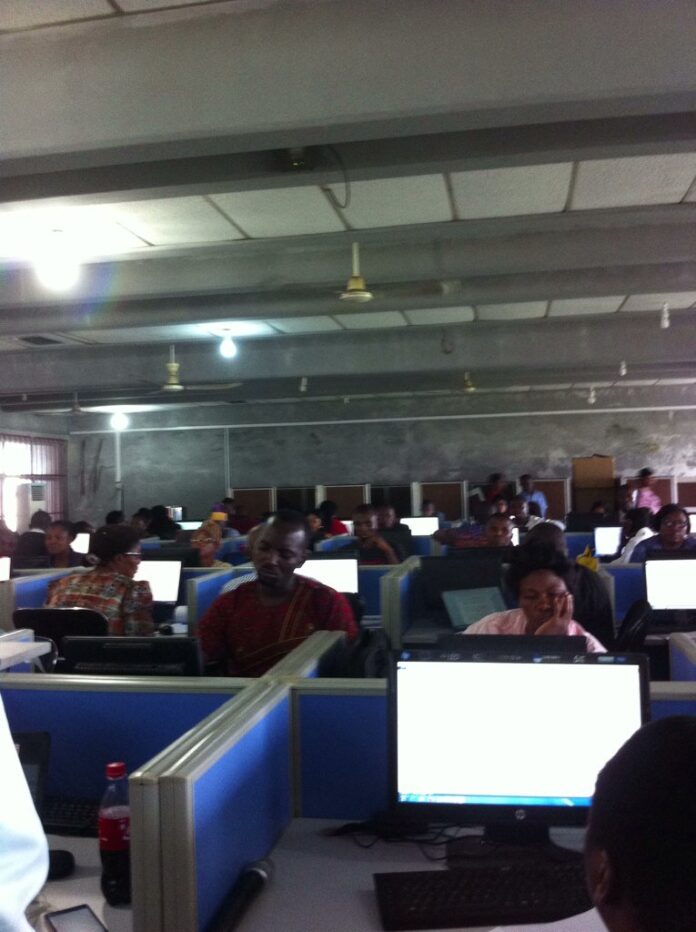In a case that has stirred mixed reactions across Nigeria, an Abuja court has sentenced a man who posed as his daughter in a national exam to six months in prison or a N100,000 fine.
The Chief Magistrate Court in Wuse Zone 2, Abuja, found ‘Professor’ Jide Josiah Jisos guilty of impersonation during the 2019 Unified Tertiary Matriculation Examination (UTME), a high-stakes entrance exam for Nigerian universities.
Jisos was arrested at Brix Academy in Abuja in 2019 when he attempted to pass himself off as a monitor from a non-governmental organization (NGO) during the UTME.
According to court reports, Jisos entered the exam hall under the pretense of monitoring the conduct of the exam on behalf of an NGO.
However, his story quickly unraveled when a member of the official JAMB monitoring team, suspicious of his credentials, confronted him.
When questioned about his affiliation with the NGO, Jisos failed to provide any credible answers.
The monitoring team leader noted inconsistencies in his responses, leading the officials to believe he was hiding something.
Upon further questioning, Jisos confessed that he had no ties with any NGO and was, in fact, there to aid his daughter in the exam.
The Joint Admissions and Matriculation Board (JAMB) immediately handed him over to security personnel for further investigation.
Fabian Benjamin, JAMB’s public relations officer, explained that Jisos’s actions were a direct violation of exam integrity and Nigerian law.
On Sunday, JAMB’s spokesperson released a statement detailing the court’s judgment, which occurred on October 24, 2024.
Chief Magistrate Hon. Justice Folashade Oyekan ruled that Jisos was guilty of impersonation, sentencing him to six months in prison but granting him the option to pay a N100,000 fine in place of the jail term.
JAMB, which oversees the UTME, has been consistently warning the public against examination malpractice.
JAMB’s spokesperson stated, “This case should serve as a lesson to all. We will not tolerate any attempt to compromise the integrity of our examinations.”
He emphasized that impersonation and other forms of cheating undermine the credibility of the exam and harm Nigeria’s educational system.
UTME, one of the most competitive exams in Nigeria, is notorious for high levels of exam malpractice due to intense competition for limited university placements.
In recent years, JAMB has introduced several measures to curb exam malpractice, including biometric verification and CCTV monitoring at exam centers.
Despite these measures, incidents of impersonation and cheating persist.
Dr. Samuel Adebanjo, an education analyst, noted that exam malpractice has become a pressing problem in Nigeria.
“Parents, in some cases, are willing to do whatever it takes to see their children succeed, even if it means bending the rules,” Adebanjo said.
He attributed such cases to the high societal pressure on students to secure university admission at any cost.
In Nigeria, higher education is viewed as a vital path to success, with millions of students competing for a limited number of university placements.
The pressure on parents to see their children succeed can sometimes lead to extreme measures, as seen in the Jisos case.
The case has sparked significant discussion, with many Nigerians expressing frustration over the perceived decline in moral standards.
Mr. Peter Aina, a father of three and a teacher in Lagos, commented, “It’s really sad to see a parent go to such lengths. What kind of example is he setting for his child?”
Aina believes that society’s focus on academic success above all else is contributing to a culture where the end justifies the means.
Others see the ruling as a necessary step to maintain accountability in the education system.
“Without strict enforcement, people will continue to find ways to cheat the system. This verdict sends a clear message,” stated Mrs. Ifeoma Nwosu, a JAMB official.
JAMB’s Benjamin stressed that the exam board will continue to enforce strict measures to prevent cases of impersonation and other forms of malpractice.
The use of impersonators has become a troubling trend in the UTME, where individuals are hired to sit for exams on behalf of others.
However, JAMB has been actively improving its monitoring mechanisms, making it increasingly difficult for impersonators to operate undetected.
In recent years, exam centers have been equipped with biometric scanners and high-definition cameras to capture and record the identity of every candidate.
Additionally, JAMB now requires candidates to undergo fingerprint verification, which has proven to be a reliable deterrent to impersonation.
The court’s decision to fine or imprison Jisos is seen as a win for JAMB’s efforts to uphold integrity.
Justice Folashade Oyekan stated in her ruling that the act of impersonation has a damaging effect on Nigeria’s education system.
She remarked, “Impersonation not only affects the credibility of our institutions but also sends a negative message to young Nigerians who should be taught the value of honesty.”
The National Assembly has also voiced concerns over Nigeria’s struggle with exam malpractice.
In recent sessions, lawmakers have called for harsher penalties for offenders and increased support for JAMB’s monitoring efforts.
This case serves as a reminder of the challenges Nigeria faces in maintaining educational standards in the face of widespread malpractice.
While some argue that education reforms are needed to reduce the pressure on students, others believe that strict enforcement and tougher penalties are the only way to tackle the problem.
JAMB confirmed that it would continue to work closely with security agencies to ensure the prosecution of anyone caught in fraudulent activities related to the UTME.
Benjamin stated, “We are committed to ensuring that only deserving students gain admission into Nigerian universities.”

